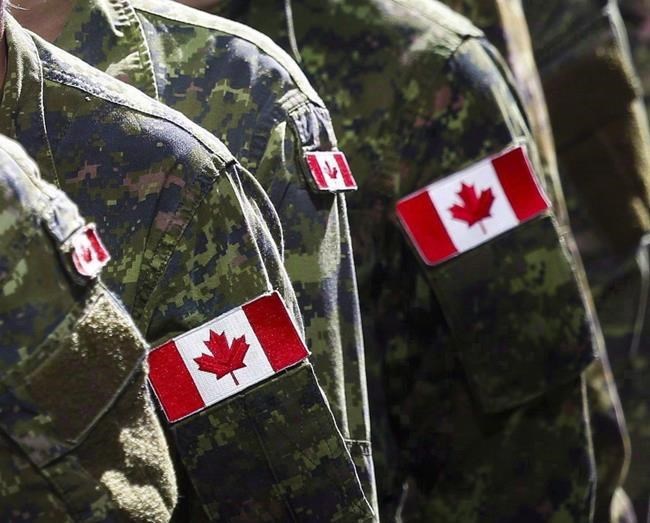Ottawa is facing calls to respond to a growing number of privacy breaches involving military members who experienced sexual misconduct while in uniform, with experts and opposition parties calling the errors unacceptable.
Epiq Class Action Services has admitted to releasing the personal details of more than 100 current and former Armed Forces members through 20 different privacy breaches since February.
The admissions have followed several reports by The Canadian Press in which veterans have come forward to report that they have received the names, contact details and claim numbers of others in error.
The most recent breach occurred earlier this month, and came despite repeated promises from Epiq that it had addressed the problems. It also followed the decision to have an external auditor assess the company’s claims process.
The Federal Court appointed Epiq to administer the government's $900-million settlement deal, which includes processing the claims of the nearly 20,000 people who have applied for compensation.
Experts on military sexual misconduct say the breaches threaten to retraumatize affected service members, and undercut trust at a time when many victims and survivors are already leery of letting down their guard.
“There is such a high barrier for victims to come forward already, especially in a military environment,” said Megan MacKenzie, the Simons Chair in International Law and Human Security at Simon Fraser University in B.C.
“I imagine that the prospect that their submissions — which likely contain very personal information and experiences — might be breached or that their identities would be revealed would be incredibly traumatizing.”
While Epiq has described the type of information inadvertently released as “limited,” several veterans who received other claimants’ information have expressed concern that their own personal data and files could be compromised.
They have also criticized Epiq for not being more forthcoming about such privacy breaches. Charlotte Duval-Lantoine of the Canadian Global Affairs Institute, whose book on military sexual misconduct was published last month, agrees with those views.
“There needs to be more communication as to what the problem is, and what is being done to resolve it,” she said.
“Putting in place an external entity to monitor the process can be reassuring, but the claimants need to be informed of what is being done every step of the way.”
A panel of claimants, lawyers and government officials tasked with overseeing the settlement ordered an independent audit of Epiq's claims process in April to prevent further problems, and the company has said an external auditor has been hired.
Retired master corporal Amy Green, who was the first veteran to come forward with reports she had been sent the personal information of dozens of other claimants, said she had no idea an audit had been ordered.
In fact, Green and fellow veteran France Menard, who also received information intended for another claimant, say neither the company, the government nor the law firms involved in the class-action settlement have reached out since they came forward.
Green is also questioning why the federal privacy commissioner has not responded to her complaints about the Epiq breach, the first of which was filed in March.
The watchdog’s office has said it is looking into a breach that was reported by Epiq, but otherwise said little for months.
Bloc Québécois ethics critic Rene Villemure suggested the problem could be the office’s lack of resources, which was highlighted by outgoing privacy commissioner Daniel Therrien during a parliamentary committee meeting earlier this year.
“When the former commissioner appeared before our committee, he said: ‘We don't have enough funding, so we can't treat everything that comes in even though it is very important,” Villemure said.
“I'm calling for the government to give more funding to the privacy commissioner so that these cases can be pursued accordingly.”
He added that it is perhaps time for the Federal Court to reconsider its appointment of Epiq and look for another administrator.
The Department of National Defence says it has asked Epiq to investigate the causes of the privacy breaches and take whatever steps are necessary to make sure the problem doesn’t happen again.
For its part, the company has pointed the finger at staff who did not follow established protocols. Disciplinary action has been taken against those employees, according to Epiq communications vice-president Angela Hoidas, and the protocols have been reinforced.
Yet the fact the problems keep happening and Epiq has yet to face any serious pushback does not sit well with veterans, and they want the Liberal government to start weighing in — something it has so far refused to do.
The Conservatives and NDP have both piled on, accusing the Liberals of letting victims of military sexual misconduct down by not doing more to hold Epiq accountable for its repeated errors.
“This situation is unacceptable,” Conservative defence critic Kerry-Lynne Findlay said in a statement.
“I urge the minister of national defence to make good on her commitment to the victims of sexual misconduct in the military, and ensure that the victims are respected, and the integrity of the settlement is not damaged any further.”
NDP counterpart Lindsay Mathyssen echoed that sentiment, saying the Defence Department’s approach so far is not working.
“We hear the Department of Defence is asking Epiq Class Action Services Canada nicely to ‘investigate and take steps to ensure that this matter is contained, resolved and does not happen again,’” Mathyssen said.
“This is not enough from a government that claims they want to uproot this problem. The government must take on the concerns from victims and concerned members of the CAF to ensure their rights and privacy are respected.”
This report by The Canadian Press was first published June 16, 2022.
Lee Berthiaume, The Canadian Press

